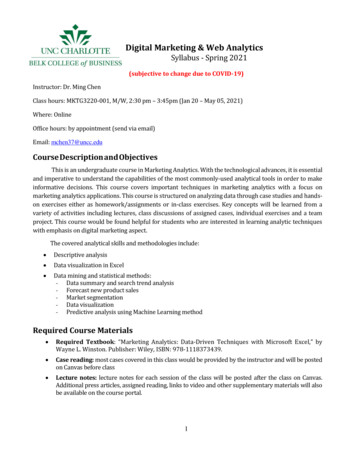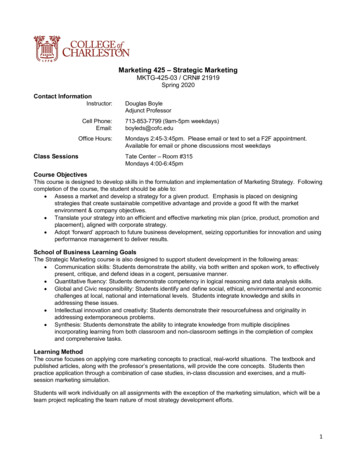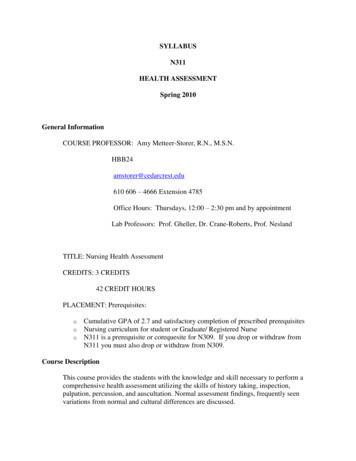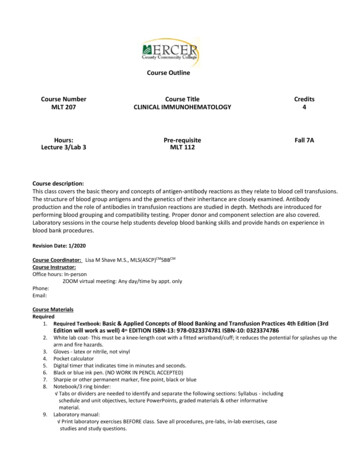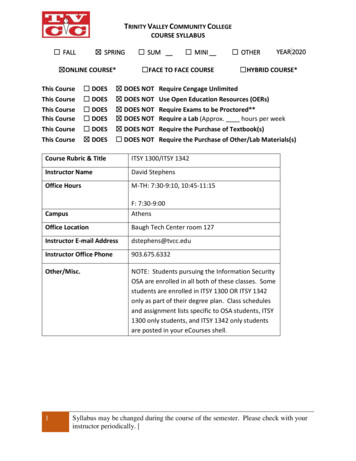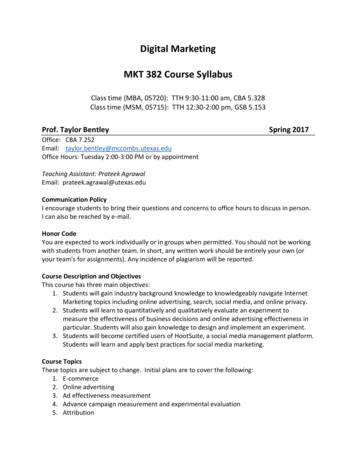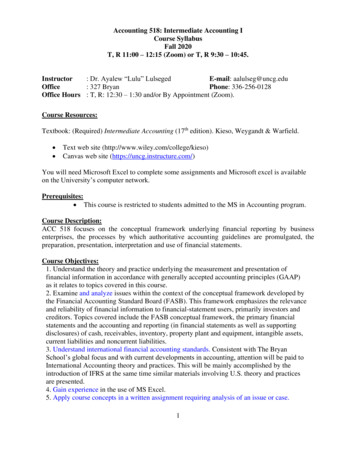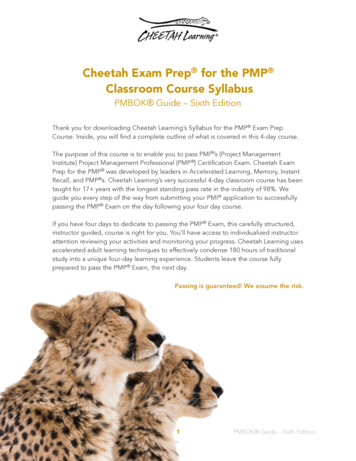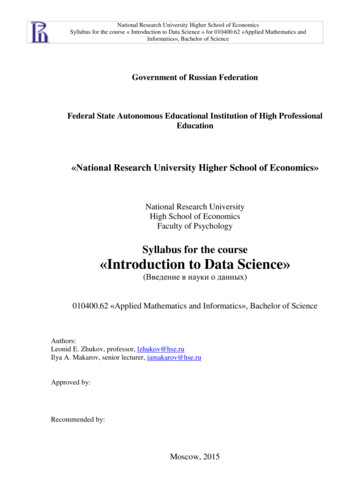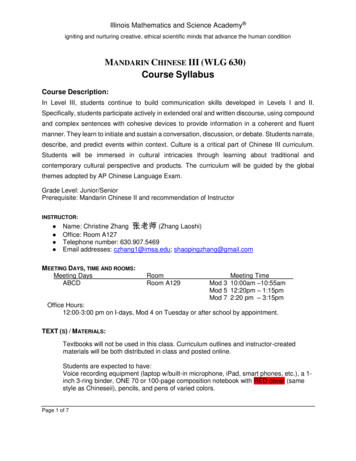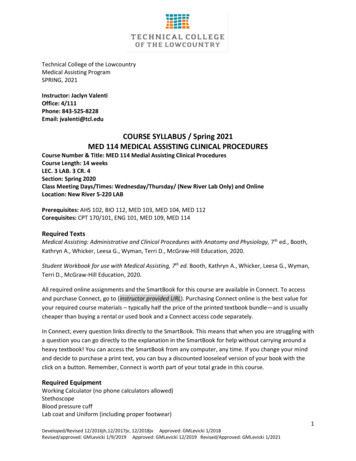
Transcription
Technical College of the LowcountryMedical Assisting ProgramSPRING, 2021Instructor: Jaclyn ValentiOffice: 4/111Phone: 843-525-8228Email: jvalenti@tcl.eduCOURSE SYLLABUS / Spring 2021MED 114 MEDICAL ASSISTING CLINICAL PROCEDURESCourse Number & Title: MED 114 Medial Assisting Clinical ProceduresCourse Length: 14 weeksLEC. 3 LAB. 3 CR. 4Section: Spring 2020Class Meeting Days/Times: Wednesday/Thursday/ (New River Lab Only) and OnlineLocation: New River 5-220 LABPrerequisites: AHS 102, BIO 112, MED 103, MED 104, MED 112Corequisites: CPT 170/101, ENG 101, MED 109, MED 114Required TextsMedical Assisting: Administrative and Clinical Procedures with Anatomy and Physiology, 7th ed., Booth,Kathryn A., Whicker, Leesa G., Wyman, Terri D., McGraw-Hill Education, 2020.Student Workbook for use with Medical Assisting, 7th ed. Booth, Kathryn A., Whicker, Leesa G., Wyman,Terri D., McGraw-Hill Education, 2020.All required online assignments and the SmartBook for this course are available in Connect. To accessand purchase Connect, go to (instructor provided URL). Purchasing Connect online is the best value foryour required course materials – typically half the price of the printed textbook bundle—and is usuallycheaper than buying a rental or used book and a Connect access code separately.In Connect, every question links directly to the SmartBook. This means that when you are struggling witha question you can go directly to the explanation in the SmartBook for help without carrying around aheavy textbook! You can access the SmartBook from any computer, any time. If you change your mindand decide to purchase a print text, you can buy a discounted looseleaf version of your book with theclick on a button. Remember, Connect is worth part of your total grade in this course.Required EquipmentWorking Calculator (no phone calculators allowed)StethoscopeBlood pressure cuffLab coat and Uniform (including proper footwear)1Developed/Revised 12/2016jh,12/2017jv, 12/2018jv Approved: GMLevicki 1/2018Revised/approved: GMLevicki 1/9/2019 Approved: GMLevicki 12/2019 Revised/Approved: GMLevicki 1/2021
GlovesBlack and red pensPPE RequirementsAll students will be required to wear PPE as deemed appropriate and necessary per clinical facility forthe duration of the clinical experience. Students will also be required to wear PPE while participatingin any “on campus” activities such as labs/lectures. Failure to adhere to this mandate will render thestudent ineligible to participate in clinical rotations or “on campus” activities, and therefore unable toprogress in the program.Course Aims and ObjectivesThis course covers examination room techniques, including vital signs, specialty examination, minorsurgical techniques and emergency procedures.Specific Learning Objectives (*denotes vital objective)By the end of this course, students will:9.1 Describe the layout and features of a typical examination room.9.2 Differentiate between sanitization and disinfection.*9.3 List steps to prevent the spread of infection in the exam and treatment rooms.*9.4 Describe the importance of temperature, lighting, and ventilation in the exam room.9.5 Identify instruments and supplies used in a general physical exam and tell how to arrange andprepare them.37.1 Describe the five vital signs.*37.2 Identify various methods of taking a patient’s temperature.37.3 Describe the process of obtaining pulse and respirations.37.4 Carry out blood pressure measurements.*37.5 Summarize orthostatic or postural vital signs.37.6 Illustrate various body measurements.38.1 Identify the purpose of a general physical exam.38.2 Describe the role of the medical assistant in a general physical exam.38.3 Explain safety precautions used during a general physical exam.*38.4 Carry out the steps necessary to prepare the patient for an exam.*38.5 Carry out positioning and draping a patient in each of the nine common exam positions.*38.6 Apply techniques to assist patients from different cultures and patients with physical disabilities.38.7 Identify the six examination methods used in a general physical exam.38.8 List the components of a general physical exam.38.9 Describe follow-up steps after a general physical exam.39.1 Carry out the role of the medical assistant in the medical specialty of gynecology.*39.2 Carry out the role of the medical assistant in the medical specialty of obstetrics.39.3 Identify diagnostic and therapeutic procedures performed in obstetrics and gynecology.*39.4 Relate the role of medical assisting to the medical specialty of urology.39.5 Identify diagnostic tests and procedures performed in urology.*39.6 Recognize diseases and disorders of the reproductive and urinary systems.2Developed/Revised 12/2016jh,12/2017jv, 12/2018jv Approved: GMLevicki 1/2018Revised/approved: GMLevicki 1/9/2019 Approved: GMLevicki 12/2019 Revised/Approved: GMLevicki 1/2021
40.1 Relate growth and development to pediatric patient care.*40.2 Identify the role of the medical assistant during pediatric examinations.40.3 Discuss pediatric immunizations and the role of the medical assistant.*40.4 Explain variations of pediatric screening procedures and diagnostic tests.40.5 Describe common pediatric diseases and disorders and their treatment.40.6 Recognize special health concerns of pediatric patients.41.1 Relate developmental changes in geriatric patients to medical assisting practice.41.2 Describe common geriatric diseases and disorders and their treatment.41.3 Identify variations of care for geriatric patients during examinations, screening procedures,diagnostic tests, and treatments.*41.4 Explain special health concerns of geriatric patients.42.1 Describe the medical specialties of allergy, cardiology, dermatology, endocrinology,gastroenterology, neurology, oncology, and orthopedics.42.2 Identify common diseases and disorders related to cardiology, dermatology, endocrinology,gastroenterology, neurology, oncology, and orthopedics.42.3 Relate the role of the medical assistant in examinations and procedures performed in the medicalspecialties of allergy, cardiology, dermatology, endocrinology, gastroenterology, neurology, oncology,and orthopedics.43.1 Describe the medical assistant’s role in eye exams and procedures performed in a medical office.*43.2 Discuss various eye disorders encountered in a medical office.*43.3 Identify ophthalmic exams performed in the physician’s office.*43.4 Summarize ophthalmologic procedures and treatments.43.5 Describe the medical assistant’s role in otology.*43.6 Describe disorders of the ear encountered in the medical office.43.7 Recall various hearing and other diagnostic ear tests.43.8 Summarize ear procedures and treatments.*44.1 Define the medical assistant’s role in minor surgical procedures.44.2Describe surgical procedures performed in an office setting.44.3Identify the instruments used in minor surgery and describe their functions.44.4 Describe the procedures for medical and sterile asepsis in minor surgery.*44.5Discuss the procedures used in a medical office to sterilize surgical instruments andequipment.44.6 Summarize the medical assistant’s duties in preoperative procedures.44.7 Describe the medical assistant’s duties during an operative procedure.44.8 Implement the medical assistant’s duties in the postoperative period.54.1 Discuss the general principles of physical therapy.54.2 Relate various cold and heat therapies to their benefits and contraindications.*54.3 Recall hydrotherapy methods.54.4 Name several methods of exercise therapy.54.5 Describe the types of massage used in rehabilitation therapy.54.6 Compare different methods of traction.54.7 Carry out the procedure for teaching a patient to use a cane, a walker, crutches, and awheelchair.*54.8 Model the steps you should take when referring a patient to a physical therapist.3Developed/Revised 12/2016jh,12/2017jv, 12/2018jv Approved: GMLevicki 1/2018Revised/approved: GMLevicki 1/9/2019 Approved: GMLevicki 12/2019 Revised/Approved: GMLevicki 1/2021
57.1 Discuss the importance of first aid during a medical emergency.57.2 Identify items found on a crash cart.57.3 Recognize various accidental emergencies and how to deal with them.57.4 List common illnesses that can result in medical emergencies.57.5 Identify less common illnesses that can result in medical emergencies.57.6 Discuss your role in caring for people with psychosocial emergencies.57.7 Carry out the procedure for calming a patient who is under extreme stress.57.8 Discuss ways to educate patients about how to prevent and respond to emergencies.57.9 Illustrate your role in responding to natural disasters and pandemic illness.57.10 Discuss your role in responding to acts of bioterrorism.Professional Objectives1. Demonstrate self-discipline and a positive attitude by being on time, being prepared for class, andsubmitting all assignments on time and in a neat and professional manner.2. Be respectful, and not disruptive, to your peers and instructor.3. Demonstrate effective oral and written communication skills by participating in class discussions,projects, problem solving, and by following verbal instructions, etc.4. Demonstrate accuracy by following directions explicitly when completing assignments.5. Adhere to HIPAA regulations by maintaining patient/student confidentiality.Grading ProceduresAt the end of each course, each student’s final grade is determined as follows:Unit Assignments and Quizzes(11):Professionalism (see Grading Methodology)Exams(10) and ding PolicyGrading scale93% - 100% A85% - 92% B78% - 84% C70% - 77% DBelow 70% F4Developed/Revised 12/2016jh,12/2017jv, 12/2018jv Approved: GMLevicki 1/2018Revised/approved: GMLevicki 1/9/2019 Approved: GMLevicki 12/2019 Revised/Approved: GMLevicki 1/2021
WWPWFIwithdrawwithdraw with passing gradewithdraw with failing gradeIncompleteGrading Methodology1.Honorlock Online Proctoring and Technology RequirementsTCL uses an online test proctoring service called Honorlock to monitor some online tests as analternative to in-person proctoring. Your instructor may elect to have some of your tests proctoredusing Honorlock. If so, you will need to make sure that you have access to the necessary equipment inorder to take your online-proctored tests:-A computer with access to a high-speed Internet connection-A webcam and microphone. A functioning webcam and microphone are required to completeproctored online tests.-Microsoft Office. Microsoft Office can be downloaded free by accessing the Office 365 link inyou TCL email account.- The ability to install the Honorlock extension on Google Chrome2.All assignments are due on the date scheduled and no late assignments will be accepted. Agrade of “0” will be given if projects or assignments are not turned in on time. If you are not going toattend class then you must turn the assignment in to the instructor prior to date due or scan and email itby the day it is due.3.A grade of ‘0’ will be recorded for missed tests except under extenuating circumstances. In orderfor a makeup test to be considered, a written excuse must be presented to the instructor (i.e. doctor, ERphysician, jury duty, accident report).4.If a lecture by a guest speaker is missed the student will be required to write a comprehensiveterm paper on the information covered. The term paper will be due within 1 week of the time missed.5.If a student is absent on an assigned presentation date, a zero will automatically be given for thepresentation grade except under extenuating circumstances which must be approved by the instructor.6.A minimum score of 80% must be met on all psychomotor and affective domain objectives(skill). Three (3) attempts will be allowed per skill / objective. The student must successfully completethe 3rd objective attempt before the end of the semester.7.If the objective is to be repeated, the highest possible recorded grade will be an 80%. If theobjective is not passed on the third attempt, the grade received is the grade recorded.8.Repeat attempts of any psychomotor and affective objectives (skills) will be scheduled at theinstructor’s discretion. The final grade must be 75.000 or more in order to pass the course and progressin the program.9.Grades are posted on Blackboard within one week of administration of tests and examinations.10.Students enrolled in classes taught online or have an online component are expected to attendon campus activities, such as testing, labs, and/or presentations as determined by program faculty.11.Professionalism grades are based on adherence to professional objectives, dress code policies,and academic integrity. Students who show academic or social misconduct based on behaviors outlinedin the Professional Objectives and Academic Misconduct sections of this syllabus or have an infraction of5Developed/Revised 12/2016jh,12/2017jv, 12/2018jv Approved: GMLevicki 1/2018Revised/approved: GMLevicki 1/9/2019 Approved: GMLevicki 12/2019 Revised/Approved: GMLevicki 1/2021
Dress Code and Professionalism section outlined in the program handbook can lose up to 5 points perincident of a total of 100 class per semester. Professionalism is worth 5% of the total class grade for thesemester.*All students are required to remove ALL watches of any kind during exams and quizzes and placethem in the front of the classroom with personal belongings and electronics.*During on campus examinations, only answers transferred and completed on Scantron sheets will begraded electronically to count towards the test score.Hazardous WeatherIn case weather conditions are so severe that operation of the College may clearly pose a hardship onstudents and staff traveling to the College, notification of closing will be made through the followingradio and television stations: WYKZ 98.7, WGCO 98.3, WGZO 103.1, WFXH 106.1, WWVV 106.9, WLOW107.9, WGZR 104.9, WFXH 1130 AM, WLVH 101.1, WSOK 1230 AM, WAEV 97.3, WTOC TV, WTGS TV,WJWJ TV, and WSAV TV. Students, faculty and staff are highly encouraged to opt in to the EmergencyText Message Alert System.With TCL’s Text Alerts you can receive immediate notification of emergency events via text messagingon your cell phone. All students are strongly encouraged to register their cell phones with this service.Signing up is easy, just fill out the simple form on the TCL website (https://tcl.regroup.com/signup).Academic MisconductThere is no tolerance at TCL for academic dishonesty and misconduct. The College expects all studentsto conduct themselves with dignity and to maintain high standards of responsible citizenship.It is the student’s responsibility to address any questions regarding what might constitute academicmisconduct to the course instructor for further clarification.The College adheres to the Student Code for the South Carolina Technical College System. Copies of theStudent Code and Grievance Procedure are provided in the TCL Student Handbooks, the Division Office,and the Learning Resources Center.Health care professionals hold the public trust. Academic misconduct by health science students callsthat trust into question and academic integrity is expected.Academic misconduct may result in withdrawal for related health science courses. Also, depending onthe severity of the student’s academic misconduct, the student will not only be withdrawn from theprogram, but will not be allowed for re-entry and/or reapplication to all Health Science programs.It is a fundamental requirement that any work presented by students will be their own. Examples ofacademic misconduct include (but are not limited to):1.Copying the work of another student or allowing another student to copy working papers,printed output, electronic files, quizzes, tests, or assignments.2.Completing the work of another student or allowing another student to complete or contributeto working papers, printed output, electronic files, quizzes, tests, or assignments.6Developed/Revised 12/2016jh,12/2017jv, 12/2018jv Approved: GMLevicki 1/2018Revised/approved: GMLevicki 1/9/2019 Approved: GMLevicki 12/2019 Revised/Approved: GMLevicki 1/2021
3.Viewing another student’s computer screen during a quiz or examinations.4.Talking or communicating with another student during a test.5.Violating procedures prescribed by the instructor to protect the integrity of a quiz, test, orassignment.6.Plagiarism in any form, including, but not limited to: copying/pasting from a website, textbook,previously submitted student work, or any instructor-prepared class material; obvious violation of anycopyright-protected materials.7.Knowingly aiding a person involved in academic misconduct.8.Providing false information to staff and/or faculty.9.Entering an office unaccompanied by faculty or staff.10.10.Misuse of any electronic devices including “cheating watches”. All students arerequired to remove ALL electronic watches of any kind during exams & quizzes and should be placedwith their personal belongings in the back of the classroom.*During paper examinations, only answers transferred and completed on Scantron sheets will begraded electronically to count towards the test score.Classroom Computer PolicyOnly assigned computer activity will be conducted during class time. If a student is observed accessing acomputer for any reason other than assigned activities, the instructor can administer a pop quiz to theentire class. Exceptions will be made on an individual basis and must be discussed with the instructorprior to the start of class.Cell Phone and Electronic Devices PolicyAll cell phones and electronic devices will be turned off and stored before class starts. If a student’s cellphone rings or if a student is observed texting or engaging in any other cell phone activity during classtime, the instructor can deduct attendance time from the student.Exceptions will be made on an individual basis and must be discussed with the instructor prior to thestart of class.Attendance1. Students will be expected to accept their responsibility for successful completion of courseobjectives and to demonstrate sincere interest in professional development by attendance at everyscheduled class and lab.When a student is unable to attend class due to illness, death in the family, etc., that student will beresponsible for notifying the instructor (not sending a message with another student) prior to theclass or lab from which the student will be absent.7Developed/Revised 12/2016jh,12/2017jv, 12/2018jv Approved: GMLevicki 1/2018Revised/approved: GMLevicki 1/9/2019 Approved: GMLevicki 12/2019 Revised/Approved: GMLevicki 1/2021
Any student absent from class is responsible for:a. Obtaining all handoutsb. Acquiring material discussed in the missed class by contacting a classmate before class to assistwith notes taken, etc.c. Assignmentsd. Understanding that pop quizzes cannot be made up.2. A total of 2 absences from lecture, lab or a combination of these will be permitted without penalty.(See tardy and early departure policy below.) Each absence, tardy or early departure thereafter fromeither lecture or lab will result in the deduction of 2 points from the student’s final grade.3. Any student who is late for class should enter quietly as to not disrupt activities already in progressor other students in the learning process. The program faculty expects that students will be on timefor each and every class and lab. A student will be counted tardy if they are 1 to 10 minutes late forclass (according to clock in room where exam is being held). Tardiness of more than 10 minutes isconsidered an absence of one class period. Faculty expects students to remain in class for the entireperiod. An early departure is defined as leaving class before class is dismissed by the instructor. Twoinstances of tardy, or two of early departure or one tardy and one early departure will equal oneabsence.4. If a student never attends or is absent for more than 10% of a class the student will be withdrawnper the atten
42.3 Relate the role of the medical assistant in examinations and procedures performed in the medical specialties of allergy, cardiology, dermatology, endocrinology, gastroenterology, neurology, oncology, and orthopedics. 43.1 Describe the medical assi
